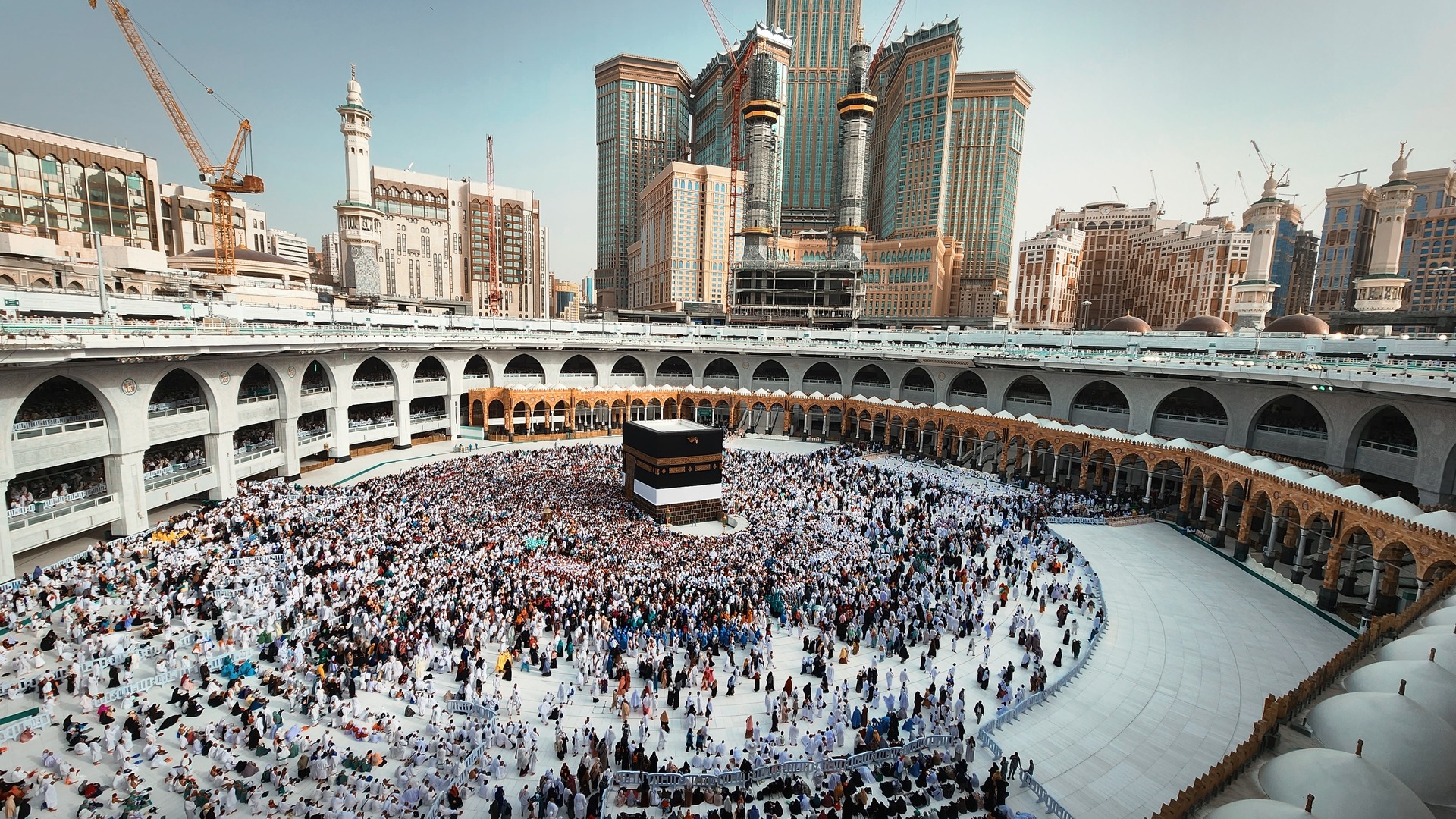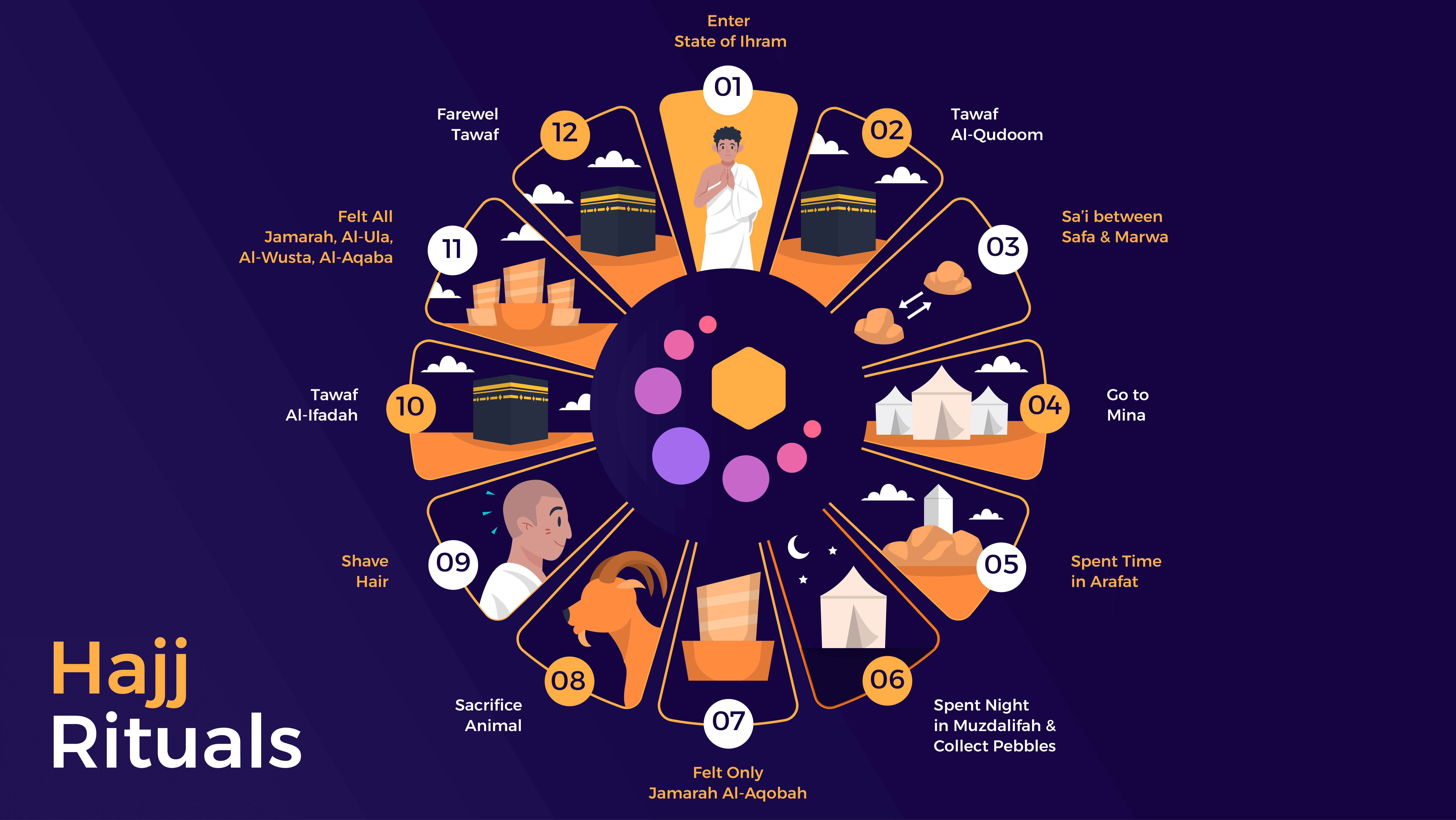Get ready for Hajj 2024

Hajj is the annual pilgrimage to Makkah, undertaken by millions of Muslims around the world, at least once in their lifetime. It is one of the stepping stones for anyone embarking on their Hajj journey due to its Islamic significance, immense rewards, and the arduous efforts required to perform among millions of others all at once.
Abu Huraira narrated that the Prophet ﷺ said,
Whoever performs Hajj to this Ka’aba and does not approach his wife for sexual relations nor commit sins (while performing Hajj), he will come out as sinless as a newborn child, (just delivered by his mother).” [Sahih al-Bukhari 1820]
Unlike Umrah, which takes only a few hours, Hajj requires several days and entails coping with the Saudi Arabian summer heat while being surrounded by millions of other pilgrims. Last year in 2023, an incredible 1.84 million Muslims attended Hajj, and this number continues to rise.
We have prepared this blog for you, covering important physical, spiritual, financial, and logistical aspects as well as essential tips to help you prepare for Hajj 2024.
Here’s an overview of the different preparation stages that we will be covering,
- Knowledge: Learning the rites of Hajj, the necessary actions at each stage, and the location-specific practices.
- Spiritual: Working on your Iman through performing extra acts of worship, memorizing Hajj-specific supplications, and understanding the significance of each Hajj ritual.
- Emotional: Cultivating patience, compassion, and humility to embrace the challenges of the pilgrimage.
- Physical: Building energy and stamina through exercise and planning.
- Logistics: Arranging travel, accommodation, and understanding the procedural aspects of Hajj.
- Financial: Budgeting for the costs associated with travel, accommodation, and any other costs.
Thorough preparation in these areas can help ensure a fulfilling and transformative Hajj experience.
Learning about the different Hajj rituals
Once you’ve booked your Hajj trip, which should be done way in advance, begin to familiarize yourself with the various stages of the pilgrimage. Learn the rituals such as circling the Kaaba, walking between Safa and Marwah, praying at Arafat, and Muzdalifah, and the symbolic stoning at Jamarat in Mina. Understanding these elements is key as each has its specific purpose and method.
Knowing the Ihram etiquette, the historical significance behind each practice, why pilgrims perform these acts, and the stories of the Prophet Ibrahim and his family will give context and a deeper understanding of the rituals.
Lastly, studying the experiences of other pilgrims can guide you in navigating the emotional and physical challenges of Hajj. Learning from their journeys can offer practical advice on staying patient and focused amidst the crowds and the intense pace of the pilgrimage.
For a seamless and spiritually uplifting Hajj, visit our blog for a detailed step-by-step guide that walks you through every stage of your pilgrimage.
Spiritual preparation for Hajj
One should begin their preparation with a firm intention and a positive mindset, adopting a new routine on a day-to-day basis that involves a deeper engagement with religious practices. Learning the tafseer of the Quran word by word from renowned scholars, memorizing Hajj-specific supplications, and busying oneself with extra acts of worship can help fortify one’s spiritual preparation for Hajj.
To further enhance your preparation, build your own Hajj notebook and document your learnings and insights. Such a practice will facilitate a robust review of your knowledge, allowing you to identify areas requiring further study.
Additionally, curate a special dua book that you would want to read at Mount Arafat and Jamarat. This compilation of duas will serve as a spiritual companion, guiding your devotions during these critical rites of the pilgrimage.
Attending Islamic lectures and Hajj workshops can offer a glimpse of the pilgrimage, explaining the significance and practical aspects of the journey. It’s also beneficial to actually practice the physical acts of worship that will be performed during Hajj.
Learn how to perform Tawaf in a simple and correct manner with our easy-to-follow guide.
Preparing mentally and emotionally for Hajj
Before setting off for Hajj, pilgrims should emotionally prepare themselves for the physical and mental challenges entailing the pilgrimage. This includes achieving mental readiness by anticipating the difficulties that may arise, such as dealing with crowds and extreme weather conditions, while also cultivating patience and perseverance.
Moreover, meeting previous Hajj pilgrims and listening to their experiences can set the right expectation when traveling. One should approach the journey with a forgiving attitude, as forgiveness is a cornerstone of Hajj. Keeping a positive mindset throughout, with an understanding of the profound rewards of Hajj, can greatly enhance the overall experience.
Build energy and stamina before traveling for Hajj
Hajj is a pilgrimage that requires days of walking and engaging in various religious rituals. Therefore, physical preparation is of paramount importance. Pilgrims should enhance their stamina through consistent physical training and seek medical advice to ensure they are fit for the journey and have all necessary vaccinations.
Navigate your Hajj journey with ease; read our blog for a collection of other essential tips geared towards a fulfilling pilgrimage.
Packing suitable clothing for the hot Saudi climate, comfortable footwear, and a basic first aid kit is essential. Familiarizing oneself with the different Makkah and Madinah localities will further equip pilgrims to meet the physical challenges of Hajj.
One common mistake pilgrim makes while entering into the state of Ihram is wearing shoes. It is prohibited to wear footwear that covers the entire foot or is made of leather. However, we should carry extra Ihram clothings and comfortable shoes to commute before-after Hajj.
We know this through the report narrated by Al-Bukhari (1543) and Muslim (1177) from `Abdullah ibn `Umar (may Allah be pleased with him), according to which a man said:
“O Messenger of Allah, what garments can the pilgrim in Ihram wear? The Messenger of Allah (blessings and peace of Allah be upon him) said: “He should not wear chemises, head coverings, pants, burnooses, or Khufuf (leather slippers), except for one who cannot find sandals, in which case he may wear Khufuf, but he should cut them so that they come lower than the ankles.”
For a comprehensive list of packing essentials, refer to the checklist here.
Travel arrangements for Hajj
For hassle-free logistical preparation, book your Hajj trip way in advance to obtain the best package. Opt for an all-inclusive package covering meals with the preferred Hajj tour company to avoid difficulties and high pricing. Don’t forget to book an appointment to visit Rawdah Sharif through the Nusuk app.
Read the Rawdah visit guide here for more information.
It is important for pilgrims to acquaint themselves with the significant sites of Mina, Arafat, and Muzdalifah. During the pilgrimage, these transitions are meticulously timed and follow a prescribed order.
Each location plays a critical role and understanding the logistics, including the distance and travel methods between them, is crucial. It ensures a smoother journey, allowing pilgrims to focus on their spiritual practices without the added stress of navigational uncertainties.

Financial preparations for Hajj
Allah SWT says in Surah Al-Imrah, verse 97,
“In it are clear signs [such as] the standing place of Abraham. And whoever enters it shall be safe. And [due] to Allah from the people is a pilgrimage to the House – for whoever is able to find thereto a way. But whoever disbelieves – then indeed, Allah is free from need of the worlds.”
Shaykh al-Islam Ibn Taymiyah (may Allah have mercy on him) said:
“It is permissible for a person who is in debt and facing financial hardship, either because he is unable to earn money or because the creditor is absent and he cannot pay him, to go for Hajj if someone else takes him for Hajj, provided that this does not affect his ability to pay the debt.” (Majmu’ al-Fatawa, 26/16)
It clearly states that Hajj is obligatory only for those who are physically able and financially capable, which includes having enough resources to cover all expenses without neglecting any debts. If you have debts, prioritize settling them, especially interest-based ones, which are haram in Islam before going for Hajj.
Save enough funds to cover travel expenses, accommodations, food, and other incidentals. It’s also wise to budget for offerings and donations you might make during the pilgrimage. Consider purchasing a comprehensive travel insurance plan that includes health coverage.
In addition, it’s important to settle any outstanding debts and have a financial plan in place for your family’s needs while you are away.
Checklist of important documents to carry during Hajj
- Ensure your passport is valid for at least six months past your departure date; renew or apply for a new one early as issuance can take weeks.
- Secure a round-trip ticket for Hajj visa issuance; travel agents generally handle visa applications and required document packages.
- Provide 4-5 passport-sized photos for visas and paperwork and carry extra copies to Saudi Arabia for local ID cards and documentation.
- Born in the U.S.A. Muslims may need a certificate confirming their faith by a competent authority for entry into Mecca and Medina.
- Carry extra copies of your passport and visa documents.
- Vaccination certificates
- Hotel booking itinerary
- Transport documents
- Receipts of payments made for Hajj/Umrah
- Relationship certificate if traveling with a companion
Fasting on the day of Arafat
For those not performing Hajj, it is recommended to fast during the day of Arafat (i.e.) the 9th day of Dhul Hijjah. Hajj 2024 is expected to fall from June 14th to June 19th, 2024, however, it is not confirmed as it depends on the sighting of the moon, different time zones, and a declaration from the Saudi govt.
Abu Qatadah Al-Ansari (RAA) narrated, ‘The Messenger of Allah ﷺ was asked about fasting on the day of Arafah (the 9th of the month of Dhul Hijjah).
He replied, “Fasting on the day of Arafah is an expiation for the preceding year and the following year.” [Muslim]
Conclusion
For those planning to embark on this holy journey and wish to travel to Madina or other destinations in Saudi Arabia, check out the best hotel rates to ensure a comfortable and peaceful experience.








